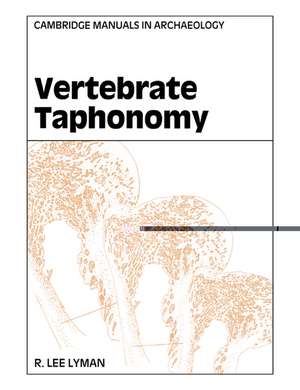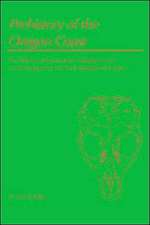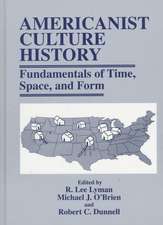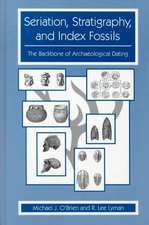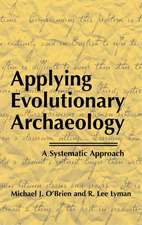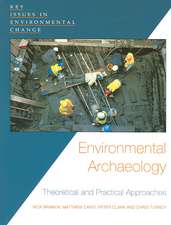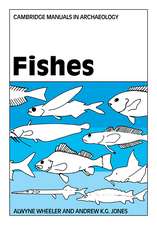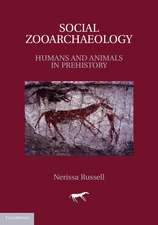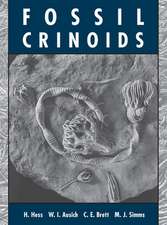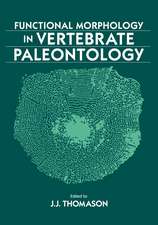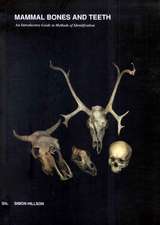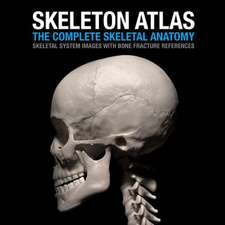Vertebrate Taphonomy: Cambridge Manuals in Archaeology
Autor R. Lee Lymanen Limba Engleză Paperback – 6 iul 1994
Din seria Cambridge Manuals in Archaeology
-
 Preț: 240.02 lei
Preț: 240.02 lei -
 Preț: 376.34 lei
Preț: 376.34 lei -
 Preț: 294.22 lei
Preț: 294.22 lei -
 Preț: 270.03 lei
Preț: 270.03 lei -
 Preț: 275.55 lei
Preț: 275.55 lei -
 Preț: 342.52 lei
Preț: 342.52 lei -
 Preț: 440.69 lei
Preț: 440.69 lei - 11%
 Preț: 518.94 lei
Preț: 518.94 lei -
 Preț: 468.36 lei
Preț: 468.36 lei -
 Preț: 398.83 lei
Preț: 398.83 lei - 11%
 Preț: 437.19 lei
Preț: 437.19 lei -
 Preț: 396.25 lei
Preț: 396.25 lei - 11%
 Preț: 426.25 lei
Preț: 426.25 lei -
 Preț: 425.46 lei
Preț: 425.46 lei - 11%
 Preț: 459.10 lei
Preț: 459.10 lei - 8%
 Preț: 416.83 lei
Preț: 416.83 lei -
 Preț: 346.70 lei
Preț: 346.70 lei -
 Preț: 375.49 lei
Preț: 375.49 lei -
 Preț: 235.03 lei
Preț: 235.03 lei -
 Preț: 278.29 lei
Preț: 278.29 lei -
 Preț: 220.33 lei
Preț: 220.33 lei
Preț: 567.01 lei
Preț vechi: 637.09 lei
-11% Nou
Puncte Express: 851
Preț estimativ în valută:
108.51€ • 117.83$ • 91.15£
108.51€ • 117.83$ • 91.15£
Carte tipărită la comandă
Livrare economică 22 aprilie-06 mai
Preluare comenzi: 021 569.72.76
Specificații
ISBN-13: 9780521458405
ISBN-10: 0521458404
Pagini: 552
Ilustrații: 46 b/w illus.
Dimensiuni: 189 x 246 x 28 mm
Greutate: 1 kg
Ediția:New.
Editura: Cambridge University Press
Colecția Cambridge University Press
Seria Cambridge Manuals in Archaeology
Locul publicării:Cambridge, United Kingdom
ISBN-10: 0521458404
Pagini: 552
Ilustrații: 46 b/w illus.
Dimensiuni: 189 x 246 x 28 mm
Greutate: 1 kg
Ediția:New.
Editura: Cambridge University Press
Colecția Cambridge University Press
Seria Cambridge Manuals in Archaeology
Locul publicării:Cambridge, United Kingdom
Cuprins
Preface; 1. What is taphonomy?; 2. The history and structure of taphonomy; 3. Taphonomy in practice and theory; 4. Structure and quantification of vertebrate skeletons; 5. Vertebrate mortality, skeletonization, disarticulation, and scattering; 6. Accumulation and dispersal of vertebrate remains; 7. Frequencies of skeletal parts; 8. Butchering, bone fracturing and bone tools; 9. Other biostratinomic factors; 10. Burial as a taphonomic process; 11. Diagenesis; 12. Taphonomy of fish, birds, reptiles and amphibians; 13. Discussion and conclusions; Glossary.
Recenzii
"...a comprehensive, detailed and accurate book that will make taphonomy accessible to specialists and nonspecialists alike. It is essential reading for all vertebrate palaeontologists, archaeologists and palaeoecologists and provides crucial background information for workers in other disciplines who use fossil material, especially molecular biologists attempting to extract DNA from fossil bone." Nature
"Vertebrate Taphonomy succeeds through a combination of clear writing, high-quality illustrations, and Lyman's encyclopedic knowledge...A good discussion, extensive up-to-date bibliography, and generally excellent glossary round out this highly recommended volume." E. Delson, Choice
"...bold in its wide coverage....Readers will see wisdom in this book, a welcome development in a field where all publications are touted as final authorities....fair and fluid, comprehensive and nonconfrontational....you leave educated and edified." Gary Haynes, Journal of Middle Atlantic Archaeology
"Lyman's book is a major scientific contribution and is both an excellent teaching tool for advanced students and a helpful guide to practicing professionals. The author successfully integrates existing knowledge and approaches from a vast array of sources....Moreover, the level of scholarship is excellent....Readers are provided with a comprehensive array of analytical alternatives and equally important, Lyman encourages readers to make their own--albeit better informed--decisions in relation to the problems." American Antiquity
"...all scientists who are interested in taphonomy or zooarchaeology can rejoice at the publication of Vertebrate Taphonomy by R. Lee Lyman....an enormous accomplishment for such a broadly based book....essential for anyone interested in taphonomy....This book is a gift to all zooarchaeologists...." Curtis W. Marean, Evolutionary Anthropology
"Vertebrate Taphonomy succeeds through a combination of clear writing, high-quality illustrations, and Lyman's encyclopedic knowledge...A good discussion, extensive up-to-date bibliography, and generally excellent glossary round out this highly recommended volume." E. Delson, Choice
"...bold in its wide coverage....Readers will see wisdom in this book, a welcome development in a field where all publications are touted as final authorities....fair and fluid, comprehensive and nonconfrontational....you leave educated and edified." Gary Haynes, Journal of Middle Atlantic Archaeology
"Lyman's book is a major scientific contribution and is both an excellent teaching tool for advanced students and a helpful guide to practicing professionals. The author successfully integrates existing knowledge and approaches from a vast array of sources....Moreover, the level of scholarship is excellent....Readers are provided with a comprehensive array of analytical alternatives and equally important, Lyman encourages readers to make their own--albeit better informed--decisions in relation to the problems." American Antiquity
"...all scientists who are interested in taphonomy or zooarchaeology can rejoice at the publication of Vertebrate Taphonomy by R. Lee Lyman....an enormous accomplishment for such a broadly based book....essential for anyone interested in taphonomy....This book is a gift to all zooarchaeologists...." Curtis W. Marean, Evolutionary Anthropology
Descriere
Archaeologists and paleontologists have become increasingly interested in how and why vertebrate animal remains become, or do not become, fossils. Vertebrate Taphonomy introduces interested researchers to the wealth of analytical techniques developed to help understand prehistoric animal remains. It is comprehensive in scope, and will serve as an important work of reference for years to come.
